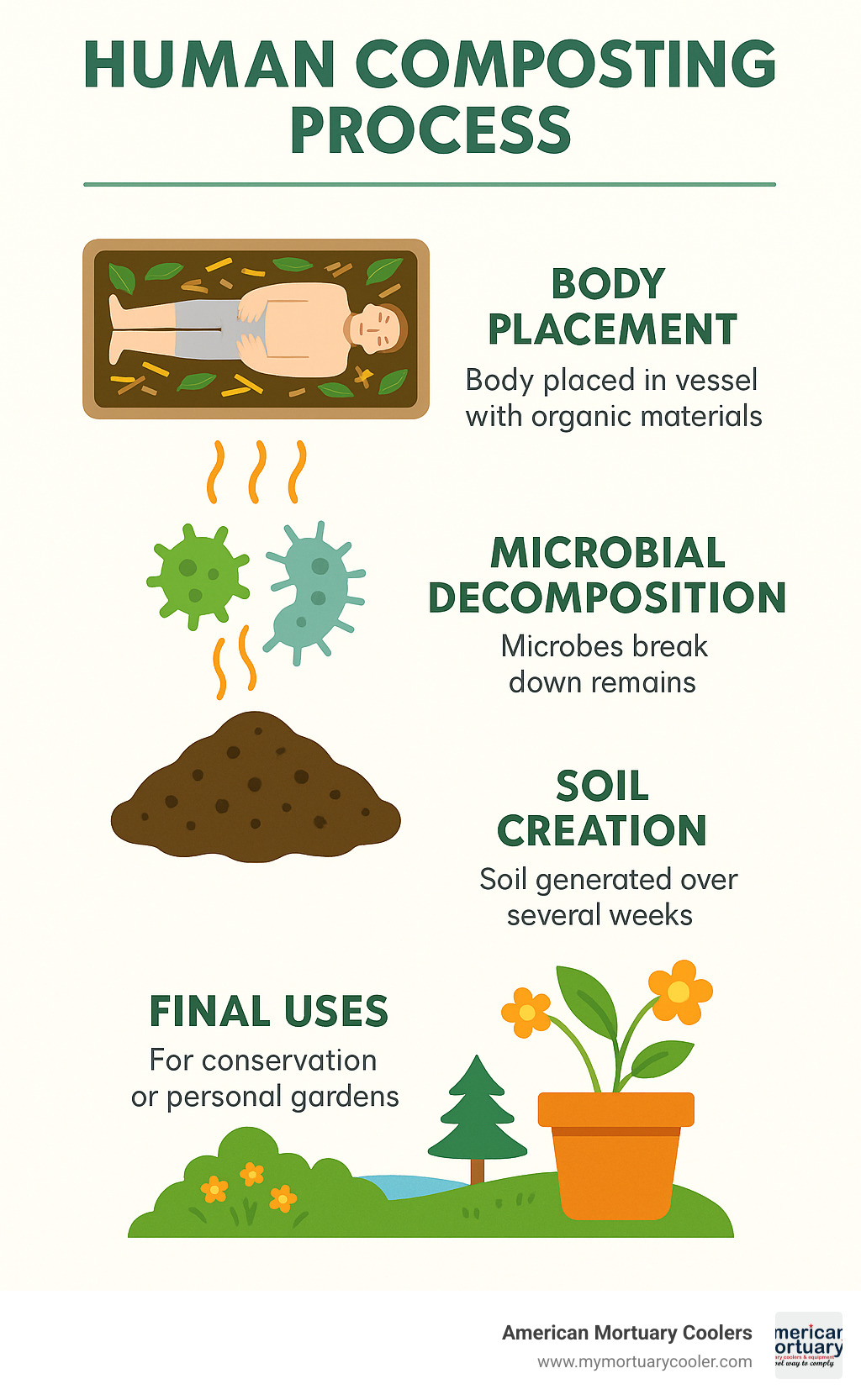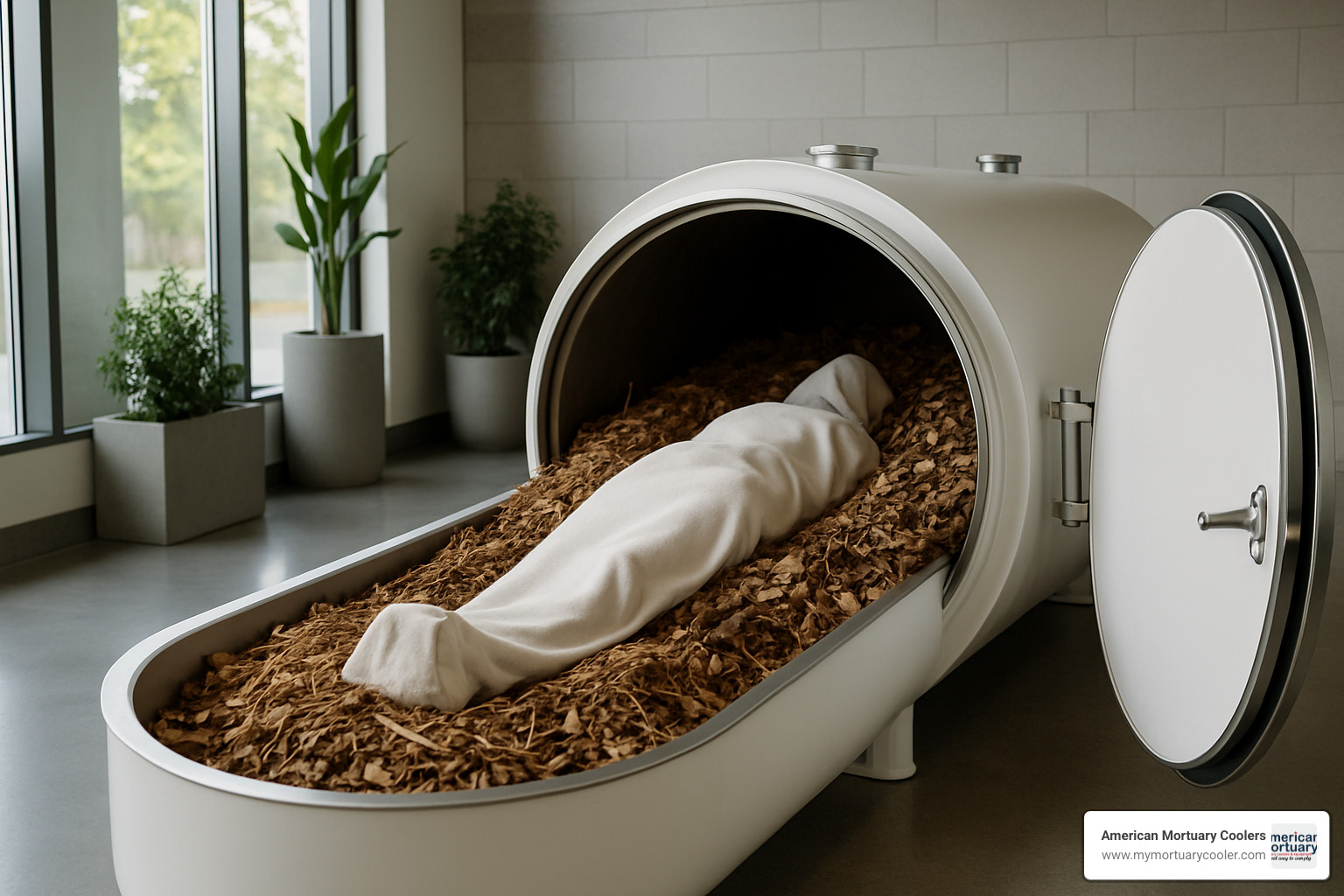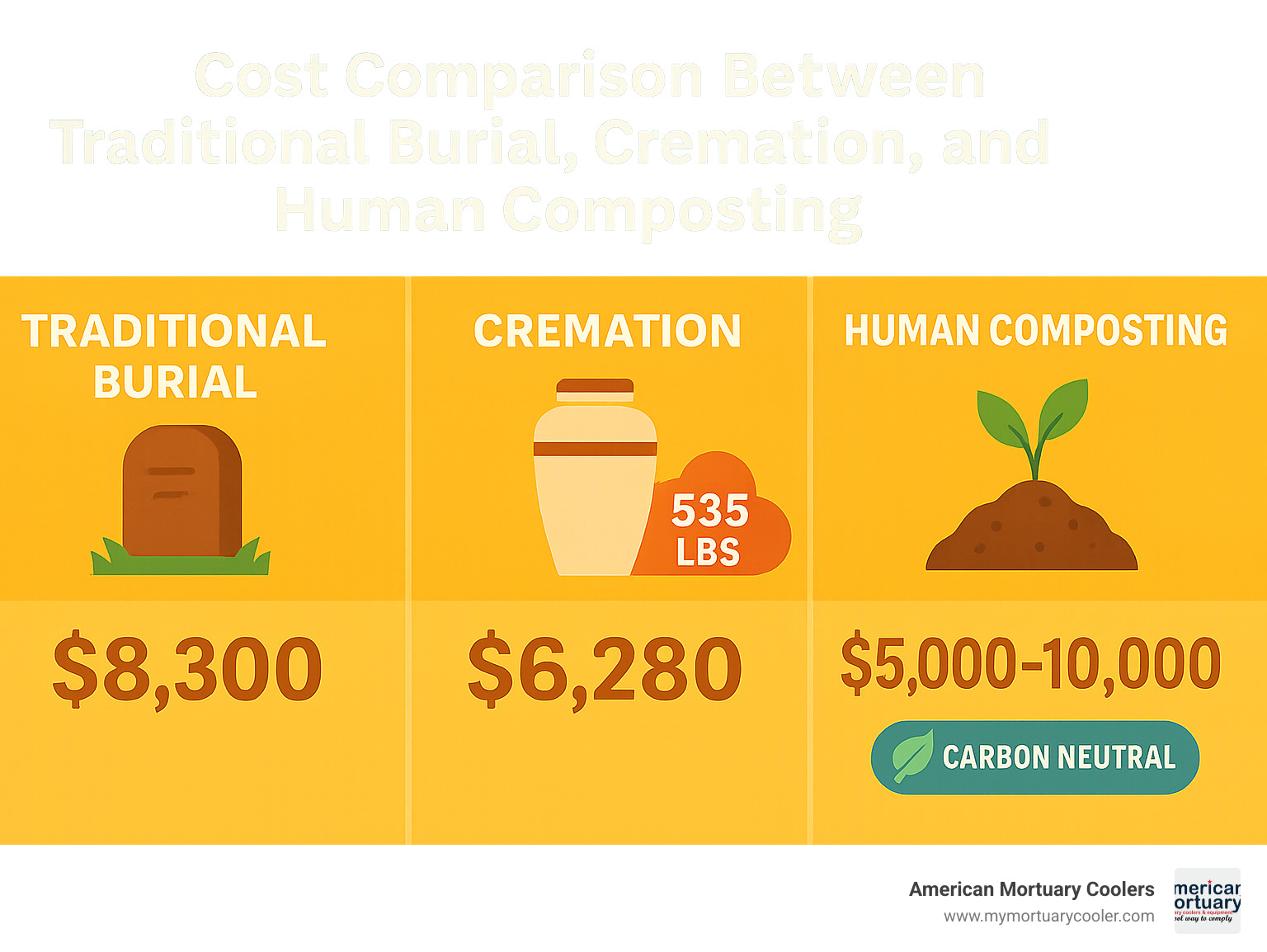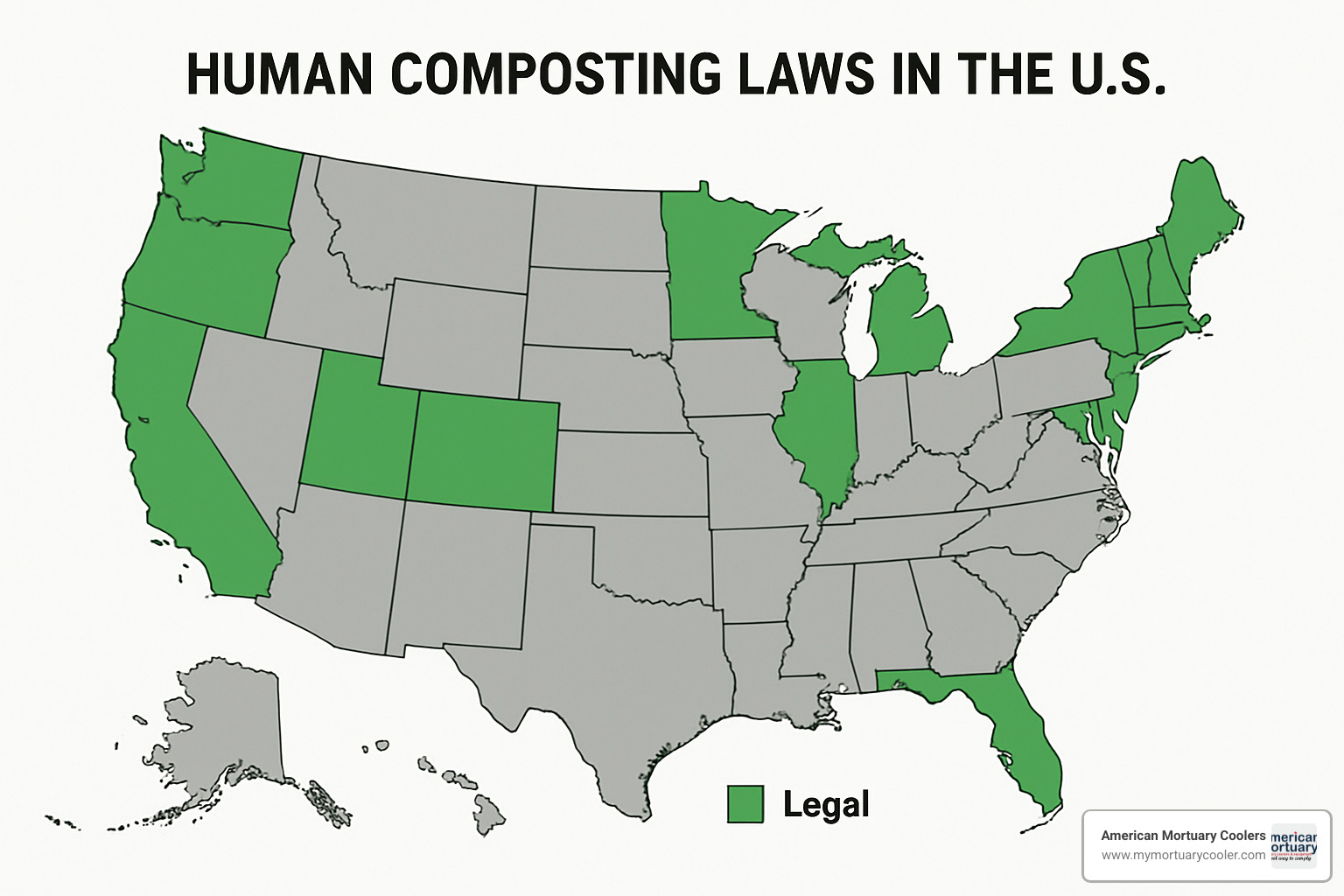Understanding Body Composting in Washington State
Body composting Washington State refers to the legal practice of natural organic reduction (human composting) that transforms human remains into soil. Since becoming the first state to legalize this practice in 2019, Washington has pioneered this eco-friendly alternative to traditional burial and cremation.
Quick Facts About Body Composting in Washington State:
- Legalization: First legalized in May 2019, effective May 1, 2020
- Process Duration: Typically 30-60 days
- Licensed Providers: Recompose, Return Home, Earth, and Herland Forest
- Average Cost: $5,000-$10,000 (comparable to traditional funeral options)
- Environmental Impact: Uses 87% less energy than cremation and produces zero mercury emissions
- Soil Output: Approximately one cubic yard (1,000 pounds) of nutrient-rich soil per body
Body composting transforms human remains into soil through a controlled biological process. The body is placed in a vessel with organic materials like wood chips, alfalfa, and straw, where microbes naturally break down the remains over several weeks.
Unlike cremation, which releases carbon dioxide and potentially mercury from dental fillings, or traditional burial, which uses resources like hardwood and concrete, body composting offers a sustainable option that returns nutrients to the earth.

Body Composting Washington State: Legal Overview
Washington made history in May 2019 when Governor Jay Inslee signed ESSB 5001 into law. This groundbreaking legislation made Washington the first state to legalize human composting, officially called "natural organic reduction." The law amended chapter 68.05 RCW, adding this new method alongside traditional burial, cremation, and alkaline hydrolysis as legal ways to care for human remains.
The law created a regulatory framework that treats body composting Washington State services similarly to cremation. Providers need proper licensing and permits, and must follow strict health and safety standards. The updated "directive regarding disposition of remains" form now includes natural organic reduction as a checkbox option, making it easy for Washington residents to legally document their wish for human composting.
When Did Body Composting Washington State Become Legal?
Body composting Washington State officially became legal on May 21, 2019, when Governor Inslee signed ESSB 5001, taking effect on May 1, 2020. This gap gave regulatory agencies time to develop specific rules for this new industry.
The bill passed with impressive bipartisan support - an 80-16 vote in the House and a 38-11 vote in the Senate. This broad acceptance wasn't surprising in a state with both the nation's highest cremation rate (77%) and a strong environmental consciousness.
Is Body Composting Washington State Safe & Regulated?
Safety and regulation are at the heart of Washington's approach to human composting. The state has implemented comprehensive testing standards and pathogen controls to ensure body composting Washington State practices protect both public health and the environment.
The Washington State Department of Health requires that the composting process maintain temperatures above 131°F for at least three consecutive days to eliminate most pathogens. The finished compost must undergo testing for pH levels, respiration rate, bioassay testing, and verification of pathogen reduction.
Washington law prohibits "backyard" human composting - all natural organic reduction must occur at licensed facilities. Most providers cannot accept remains with certain conditions like Ebola, tuberculosis, or prion diseases.
For more detailed information about morgue cooler requirements that complement these services, you can check our guide to morgue cooler requirements in Washington State.

The Human Composting Process Step-by-Step
The body composting Washington State process follows the same natural principles that transform fallen trees and animals into rich forest soil, just in a controlled setting that ensures dignity and safety.
The unembalmed body is carefully washed and wrapped in a biodegradable shroud. It's then placed in a specially designed vessel – typically a stainless steel container about 8 feet long and 4 feet tall. Around the body, staff layer a mixture of wood chips, alfalfa, and straw that provides the perfect balance of carbon and nitrogen.
Naturally occurring microbes begin breaking down tissues. The vessel maintains temperatures above 131°F for at least three days – warm enough to eliminate harmful pathogens. Throughout the 30-60 day process, staff monitor and adjust conditions, periodically rotating or aerating the vessels.
Once complete, the resulting material passes through screening to remove non-organic items like medical implants or dental fillings. The soil then cures for another 3-5 weeks. Any remaining bone fragments are mechanically reduced and folded back into the soil.
The end result is about one cubic yard of rich, life-giving soil with a balanced pH between 6.5 and 7, vibrant with nutrients like nitrogen, phosphorus, and potassium.
Providers Licensed in WA
Washington State is home to four pioneering providers offering body composting Washington State services:
Recompose stands as the original trailblazer, founded by Katrina Spade who first championed the concept. They opened the world's first facility in Seattle in December 2020, offering transportation, the full process, and options for families to take soil home or donate it to restoration projects.
Return Home in Auburn brings a personal touch with their large-scale Terramation center. They welcome families for "laying-in" ceremonies and allow visits throughout the composting journey. They've dedicated 8 acres of woodland for soil placement.
Earth operates as a forward-thinking green funeral home in Seattle with a carbon-neutral approach. They maintain conservation land on the Olympic Peninsula where families can choose to place soil.
Herland Forest Natural Burial Cemetery offers perhaps the most natural setting, combining natural burial options with composting services in a beautiful forest setting.
Timeline & Family Involvement
One beautiful aspect of body composting Washington State is how it opens doors for meaningful family participation throughout the entire journey.
The process typically begins with a "laying-in" ceremony. Unlike rushed goodbyes at conventional funerals, these ceremonies allow families to take their time and personalize the space with music, readings, flowers, and mementos.
Many families find comfort in decorating the vessel itself with photos, artwork, dried flowers, or written messages. Return Home's open-door policy during the composting process allows families to visit throughout – an ongoing connection many find comforting during grief.
Throughout the journey, providers maintain regular communication with families, sharing updates about the natural progression. When the process completes after 8-12 weeks, many families gather for a soil return ceremony, perhaps planting a memorial tree or creating a dedicated garden space.

Environmental & Cost Benefits vs. Burial & Cremation
When Washington became the first state to legalize human composting, environmental considerations played a major role. The benefits of body composting Washington State compared to traditional methods are substantial.
Human composting is a carbon-neutral option. While cremation releases about 535 pounds of CO₂ per body—equivalent to a 600-mile road trip—composting actually helps sequester carbon. Research by environmental scientist Dr. Troy Hottle found that each person who chooses composting saves between 0.84 and 1.4 metric tons of carbon dioxide.
The process uses approximately 87% less energy than cremation, which requires maintaining intense 1,400-1,800°F temperatures for hours.
Traditional burial consumes enormous resources annually: 30 million board feet of hardwood, 1.6 million tons of concrete, 800,000 gallons of embalming fluid, and 90,000 tons of steel. Body composting Washington State eliminates these resource demands entirely.
Cremation also produces mercury emissions when dental fillings are cremated. Human composting produces zero mercury emissions since metals are removed and recycled.
Regarding land use, while green burial uses less land than conventional burial, human composting requires no dedicated cemetery land at all. Instead of permanently occupying space, the resulting soil nourishes new plant life.
Financially, the costs are competitive with traditional options. The median price for body composting Washington State services runs about $7,000, falling between traditional burial and cremation:

Traditional burial averages $8,300 (not including the cemetery plot), cremation with a funeral service typically costs around $6,280, and human composting ranges from $5,000-$10,000.
As scientific research on composting's carbon impact continues to emerge, the environmental case for this option only grows stronger.
Planning, Providers & Logistics
Planning for body composting Washington State services involves several important considerations. Washington State has updated their standard "Directive Regarding Disposition of Remains" form to include natural organic reduction as an explicit option. This legally binding document should be completed, witnessed, and included with your estate planning papers.
If death occurs outside of Washington, interstate transport permits can be arranged through a local funeral home or directly with your Washington provider. Human composting services are available to residents of all 50 states, though transportation logistics and costs should be factored into planning.
Pre-planning has become increasingly popular. Most providers offer programs similar to traditional funeral pre-arrangements – Recompose has their "Precompose" membership, Return Home provides a Terramation pre-planning program, and Earth offers "Earth Prepaid" options.
Religious considerations vary widely across faith traditions. While the U.S. Conference of Catholic Bishops has officially opposed human composting, some Protestant denominations have accepted the practice as aligned with "dust to dust" teachings. Jewish and Muslim traditions typically prefer burial, though individual interpretations vary.
Washington providers have established meaningful soil donation programs that support environmental restoration. Recompose's Land Program donates soil to nonprofit conservation organizations, Return Home maintains a dedicated 8-acre woodland, Earth uses donated soil for restoration projects on the Olympic Peninsula, and Herland Forest incorporates soil into their natural burial cemetery.
For more comprehensive information about the various options available, visit our guide to human-composting options.
Costs & Payment
When considering body composting Washington State services, most families find the costs comparable to traditional funeral options. The typical price range falls between $5,000 and $10,000, with most providers charging around $7,000 for their standard package.
Standard packages generally include transportation of the body (within a certain radius), preparation care, the composting process itself, return of the resulting soil, filing of death certificates and necessary permits, basic ceremony space, and online memorial options.
Potential additional expenses might include long-distance transport, additional ceremonies, custom containers for soil return, shipping soil to distant locations, or additional death certificates.
Payment options are flexible with most Washington providers. Beyond standard payment methods, many offer pre-payment plans that lock in current pricing. Some providers also work with funeral trusts or accept insurance assignments, and installment plans may be available.
For families facing financial constraints, assistance options exist. Recompose has established a Community Fund to help offset costs for those who cannot afford the full price. Some providers offer sliding scale pricing based on financial need.
Out-of-State Access
Living outside Washington doesn't mean you can't choose body composting Washington State services. All of Washington's human composting providers serve families from across the nation.
Interstate transport is the primary logistical consideration. Most families work with a local funeral home to arrange transport to Washington. For those who prefer a more hands-on approach, self-transport is possible with proper permits.
Cost is naturally a consideration for interstate transport. Proximity matters – transport from neighboring states typically costs between $800-$1,500, while cross-country transport can range from $3,000 to $5,000.
Several important requirements must be met: the body must remain unembalmed, proper refrigeration must be maintained during transport, all interstate permits must be obtained, and transport should be arranged quickly after death occurs.
The good news is that human composting is gaining legal recognition beyond Washington's borders. Currently, 13 states have followed Washington's lead in legalizing this sustainable option.

Frequently Asked Questions about Body Composting in Washington
How long does the process take?
The body composting Washington State process typically takes between 30 and 60 days for primary decomposition, but the complete journey from death to returning soil to the family spans about 8-12 weeks total.
The journey begins with placement in the vessel within 1-3 days after death. The active decomposition phase lasts 30-45 days as microbes do their essential work. Following this, the soil needs 3-5 weeks for curing and screening, ensuring it's stable and mature. Finally, after 1-2 weeks of final preparation, the soil is ready to return to the family.
Providers don't rush this natural process. They carefully monitor various indicators to ensure the change is complete, prioritizing both safety and quality of the resulting soil.
Can families keep some of the soil?
Yes, families have complete flexibility in what happens with the soil created through body composting Washington State services. Each body generates approximately one cubic yard of nutrient-rich soil—about 1,000 pounds—giving families several meaningful options.
Many families choose to receive all of the soil, typically delivered in biodegradable containers. Others prefer a partial return, perhaps taking 1-3 containers while donating the remainder to conservation efforts. Some families keep just a small symbolic amount as a keepsake, while others donate the entirety to restoration projects.
The soil creates beautiful opportunities for remembrance through memorial gardens, trees, or divided among relatives. Washington State treats this soil similarly to cremated remains legally, meaning you'll need landowner permission for placement.
Is human composting accepted by major religions?
Religious perspectives on body composting Washington State services vary widely between and within faith traditions.
Within Christianity, the U.S. Conference of Catholic Bishops' Committee on Doctrine has formally opposed the practice. However, many Protestant denominations view human composting as aligned with the Biblical "dust to dust" teaching. Some Episcopal priests actively support the practice as environmental stewardship.
Traditional Jewish and Islamic practices generally favor prompt burial with minimal intervention, though Reform and Conservative Jewish communities may be more open to alternative approaches.
Buddhist and Hindu traditions typically have fewer prohibitions against alternative disposition methods, and the environmental benefits of composting may resonate with their values of non-harm and respect for the natural world.
Religious interpretations evolve over time, and individual clergy members may hold views different from official positions. Many Washington families successfully incorporate meaningful religious elements into human composting services.
If faith considerations are important in your end-of-life planning, we recommend consulting with your religious leaders.
Conclusion
As pioneers in the death care industry, we at American Mortuary Coolers have watched the landscape of end-of-life options transform dramatically. Body composting Washington State represents one of the most meaningful innovations we've seen – a return to natural processes with modern scientific understanding.
Washington's groundbreaking 2019 legislation has sparked a quiet revolution that has spread to 13 states. The environmental benefits are compelling – using 87% less energy than cremation, producing zero mercury emissions, and preventing between 0.84 and 1.4 metric tons of CO₂ from entering our atmosphere per composting.
Beyond the environmental benefits is something deeply human. Many families share how meaningful it feels to see a loved one nurture new life – a living memorial that can last for generations.
The four Washington pioneers – Recompose, Return Home, Earth, and Herland Forest – continue refining their approaches as demand grows, each with their unique philosophy and process.
If you're considering body composting Washington State services, we encourage you to reach out directly to these providers. Visit their facilities when possible, meet their staff, and determine which aligns best with your values. Most importantly, document your wishes clearly in legally binding directives.
Here at American Mortuary Coolers, from our home base in Tennessee serving funeral professionals across the contiguous 48 states, we remain committed to supporting this evolution in death care. Our custom mortuary refrigeration equipment helps maintain dignity during the transition to whatever disposition method families choose.
The journey of body composting Washington State from novel concept to increasingly mainstream option shows how innovation can align with our deepest values – honoring our loved ones with dignity while also honoring the planet that sustained them.
For more information about comprehensive human composting options and how funeral facilities are adapting to these new methods, visit our resource center.
















